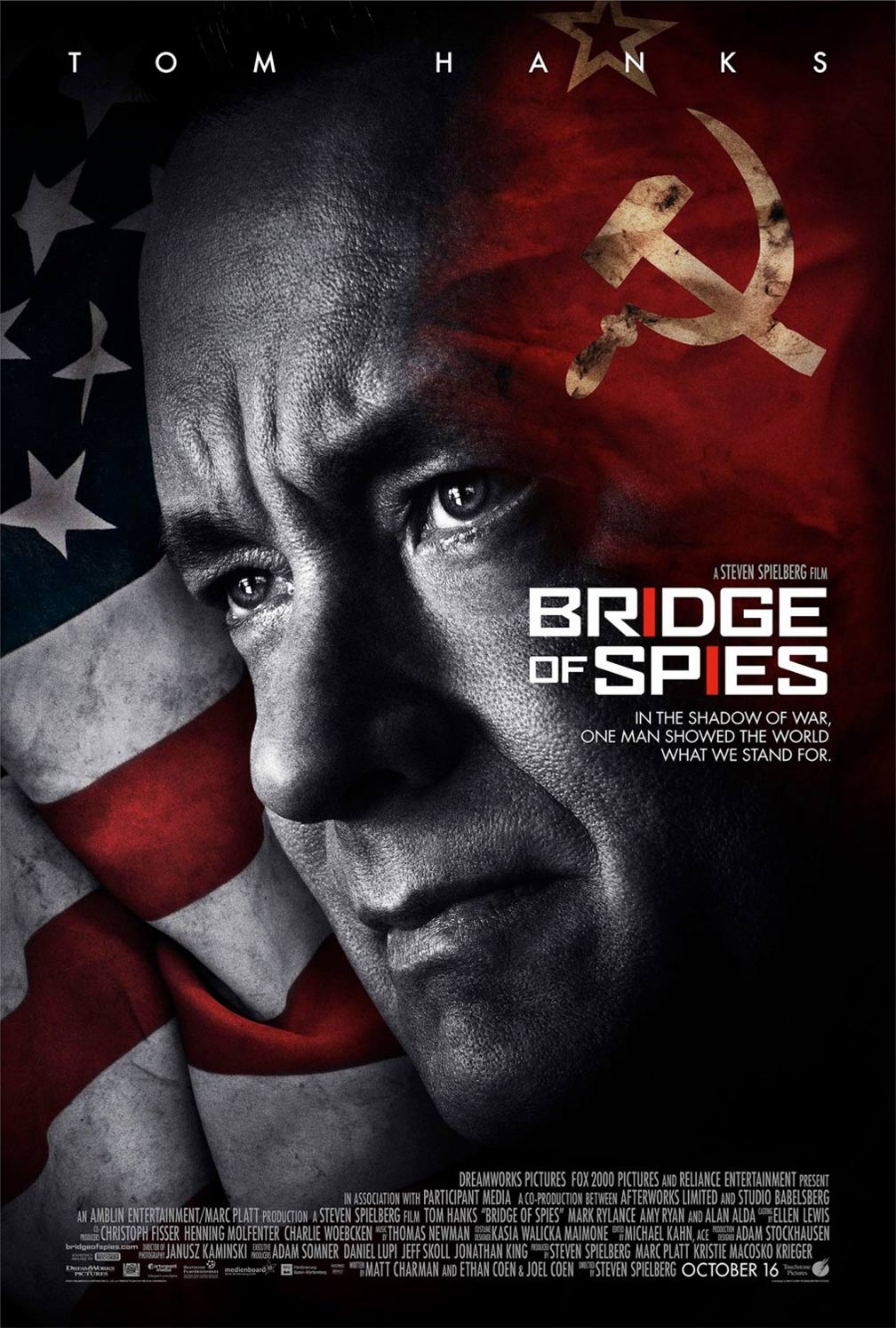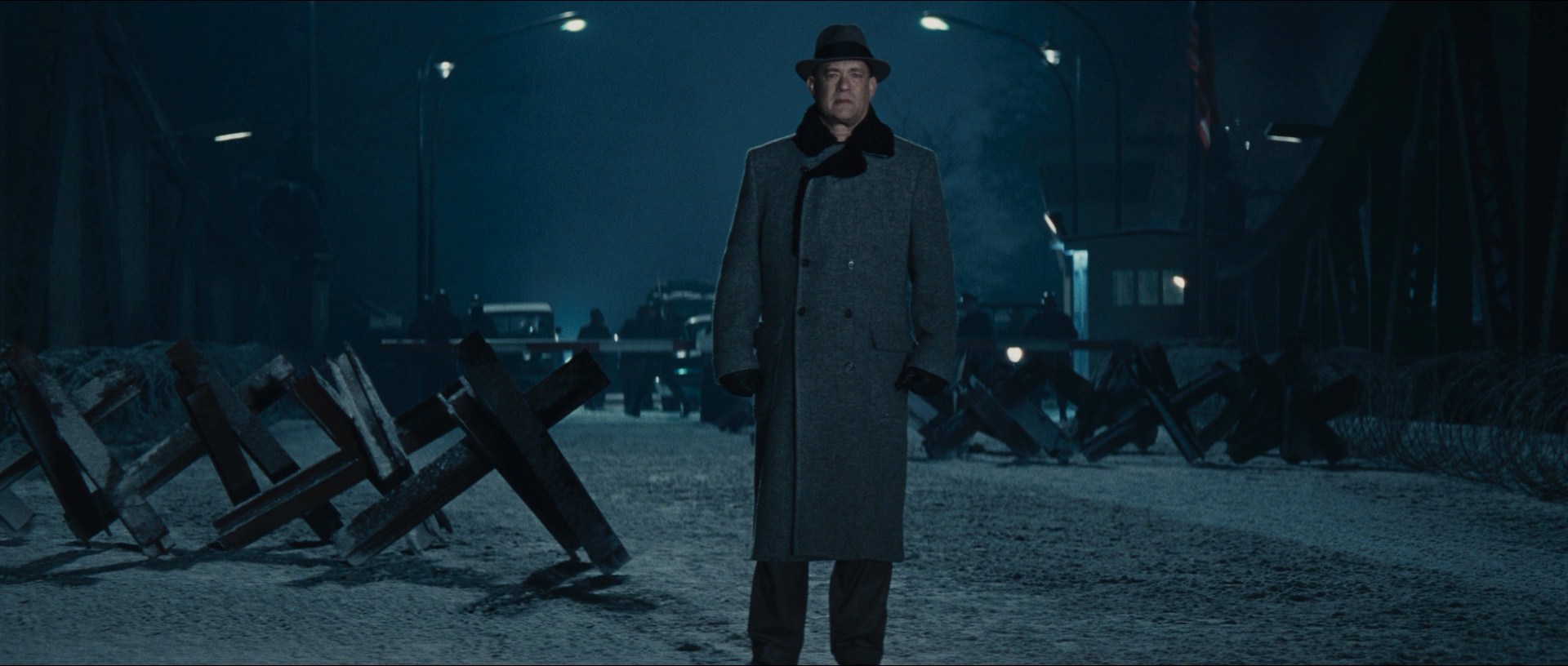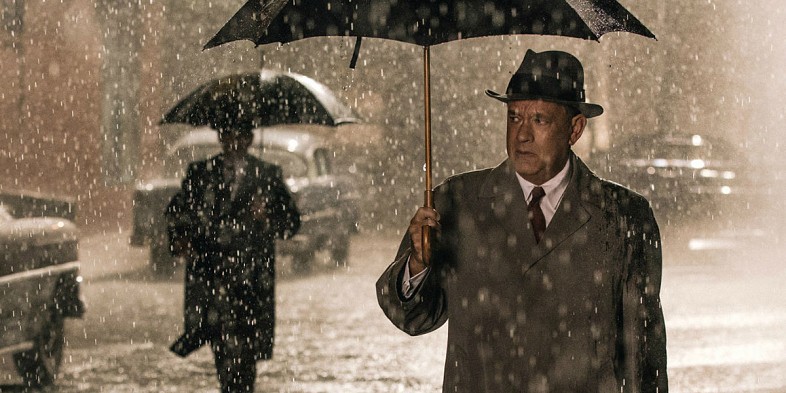
Nordling here.
BRIDGE OF SPIES is a spiritual continuation of what Steven Spielberg displayed with LINCOLN – two parties, bridging an unimaginable gulf of politics, morality, and culture, with the simple power of sitting in a room and talking about those differences. Like LINCOLN, BRIDGE OF SPIES luxuriates in the spoken word. The vernacular may be more modern, but the intent is the same. It doesn’t hurt when you have screenwriters like Tony Kushner for LINCOLN, or Matt Charman and the inimitable Joel and Ethan Coen for BRIDGE OF SPIES.

But this is not unfamiliar ground for Spielberg. His films have always been about the cinematic power of communication and common ground – whether it’s through humanity and an alien intelligence speaking through musical notes, or an Arab and a Jew momentarily bonding over soul music on the radio. Belloq in RAIDERS OF THE LOST ARK calls the Ark of the Covenant “a radio for speaking to God”, even if in the end Belloq doesn’t like what God has to say to him. Even a movie like 1941 is about miscommunication and the chaos that it can bring. This has been the major theme of his work from the very beginning. BRIDGE OF SPIES continues that theme, and brings modern ideas and context to this Cold War story.
It is 1957, and the United States and the USSR are enemies in combat. This is not a combat with guns and bombs, but with information and loyalty. Rudolf Abel (Mark Rylance) is one of those combatants, a British-born Russian spy caught by the American government. The United States wants there to be no question to the integrity of the criminal trial for espionage and treason, so they assign James Donovan (Tom Hanks), an insurance attorney and family man, to represent him at trial. Donovan is dedicated to his country, but he also believes in the law, and he intends to give Abel true representation for the trial that follows, much to the chagrin of his law firm boss Thomas Watters Jr. (Alan Alda).

But events soon escalate beyond what Donovan had predicted – Francis Gary Powers (Austin Stowell) is shot down while taking photographs from his U2 plane over the Soviet Union. Donovan recognizes the simple fact that the United States government is unwilling to consider – that Abel isn’t treasonous; instead he is a patriot for his country, just as Powers is for ours. But as Donovan understands the ramifications of what is happening, the United States sends him to East Berlin in hopes of negotiating a swap. Donovan is out of his element, only armed with his knowledge of the law, and his skills as a keen communicator and arbitrator.
Spielberg captures the era perfectly, from the “Duck and Cover” cartoons shown to kids in school to the patriotic fervor of the public in a world of uncertainty and fear. Sound familiar? It doesn’t take much work for Spielberg to apply a bit of allegory to the current world, but he’s also savvy enough to offer a bit of an answer instead of a simple examination. In BRIDGE OF SPIES, even sitting down at a table with the other side could be dangerous at any moment, but it is even more dangerous to do nothing. Spielberg offers a solution – to talk about these issues instead of hiding behind bluster and dogma, and in doing so everyone discovers the astounding truth – that we all are human, and share common interests, struggles, and hopes. The enemy is not alien. In our refusal to acknowledge our shared toils, we lose this essential truth. People sitting in a room, talking, can effect positive change. Steven Spielberg truly believes that, and he truly believes that our ability to empathize with each other and with other cultures is what makes America great, and that we are perilously close to losing that ideal, and our sense of justice is inextricably bonded with that empathy.

Perhaps it’s not as apparently noble as armed combat, but James Donovan is as much a soldier as someone on the battlefield. For Donovan, there is no other option, because true war is unthinkable to him. Donovan is hopeful but pragmatic, and knows that if he can’t negotiate his way through, it would mean something far worse than the fate of not just two men in prison, but the entire world. When a second American is taken by the East Berlin police, Donovan is resolute in representing them both, even as it threatens the release of Powers. Tom Hanks has had a long and varied career, but this is some of the best work he has ever done as an actor. It was no accident that Spielberg chose him for this role; there is a cinematic kinship with Hanks, which makes it easier when Hanks takes us down paths we wouldn’t have gone otherwise. Hanks and Mark Rylance have a nice chemistry together, and BRIDGE OF SPIES is often very funny.
Spielberg is also very careful not to overwhelm BRIDGE OF SPIES with sentiment; the big moments are thoroughly earned, and Thomas Newman’s score (his first collaboration with Spielberg) is a natural fit for what Spielberg is trying to do. Newman wisely restrains the bombast and allows Spielberg’s strength as a storyteller to take over. Even the opening scene is very controlled, with very little dialogue, as Abel is pursued in the streets, so that when people finally speak we are relieved – these people are human after all. Janusz Kaminski’s cinematography is effective and temperate as well; I’ve always loved it when Spielberg’s films are at the 2.35-to-1 ratio.

BRIDGE OF SPIES’ suspense comes not from grandiose cinematic moments, but from quiet decisions by powerful people, and Steven Spielberg examines the cracks of their ironclad doctrines to find the humanity within. Throughout his amazing career, Spielberg has examined the humanity amongst the paroxysm first. Other filmmakers inspired by his work throughout the years have often traded the two – people take a backseat to the spectacle. Great cinema has always been about not simply showing these monumental, historical events, but putting the audience directly inside it, side-by-side with the characters. Perhaps this isn’t as ostentatious as other filmmakers, but for me it has always been what makes Spielberg my favorite filmmaker of all time. I don’t watch his films – I live inside them. BRIDGE OF SPIES is no different. Spielberg finds the heart of history, and we feel each beat as our own. This is an outstanding film.
Nordling, out.
